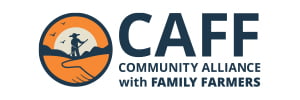 Concerned about the impacts of SGMA on your farm? Join CAFF’s farmer support network for resources, connections with other CA farmers, and the opportunity to influence State policy to serve family farmers’ needs
Concerned about the impacts of SGMA on your farm? Join CAFF’s farmer support network for resources, connections with other CA farmers, and the opportunity to influence State policy to serve family farmers’ needs
The Community Alliance with Family Farmers (CAFF) is examining the current and potential impacts of the Sustainable Groundwater Management Act (SGMA) on small farms in various overdrafted groundwater basins around California.
Some of the possible outcomes of SGMA that we are concerned about include:
- Groundwater levels decline below farms’ well depths—either in a drought or permanently due to Groundwater Sustainability Plan (GSP) minimum thresholds—and these farms lack the funds to deepen wells
- Groundwater marketing schemes cause landlords to sell water out from under farmers who are renting the land
- Metering of wells, pumping fees, and other SGMA costs disproportionately impact small farmers
- Allocation rules overly impact crops grown by locally-oriented farms or provide too little water for very small farms to survive (i.e. farms unable to rotate land)
If SGMA impacts farm wells it will likely also impact rural residential wells. For this reason, CAFF is collaborating with organizations concerned about rural residents and socially disadvantaged communities to identify how to support these communities.

CAFF is organizing an informal network of farmers to assess the impacts of SGMA in selected overdrafted groundwater basins. Our network will convene every three months via internet starting in January 2021 to share experiences and strategize about protecting the interests of family farmers. Initially we are focusing on the east side of the San Joaquin Valley from Stockton to Fresno, and on certain coastal basins, including Paso Robles, Salinas, and Watsonville. Farmers will advise us on SGMA implementation issues in their local areas. CAFF will also aim to comment on GSPs and projects that we determine are not in these farmers’ interest, with the goal of elevating such concerns to state agencies and politicians. For example, we might consider state legislation to fund mitigation for farmers whose wells are dewatered or to alter water marketing policy if warranted. CAFF maintains the California Agricultural Water Stewardship Initiative (CAWSI) web site (www.agwaterstewards.org), where we will share highlights and resources around this project.
If you are interested in joining this network or for more information contact:
Dave Runsten, Policy Director, dave@caff.org, 310-925-0857
Emily Buerer, Climate Smart Farming Program, emily@caff.org, 925-719-3379

